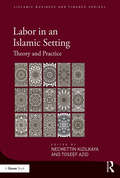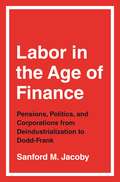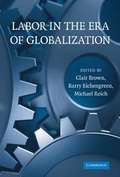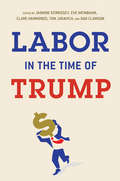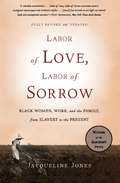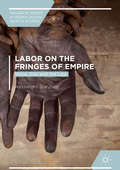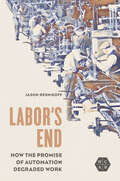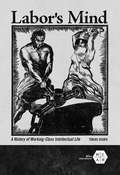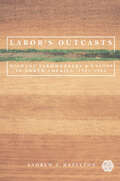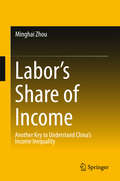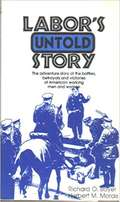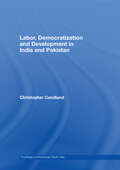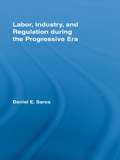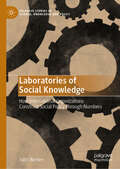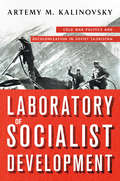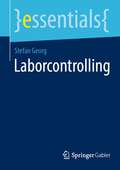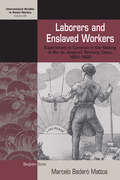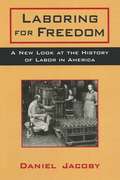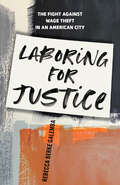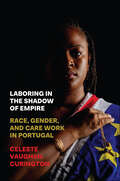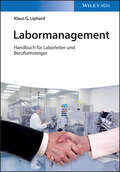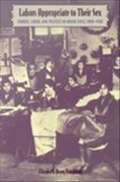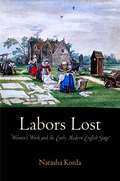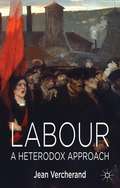- Table View
- List View
Labor in an Islamic Setting: Theory and Practice (Islamic Business and Finance Series)
by Necmettin Kizilkaya Toseef AzidThe Islamic labor market rests on the principles of the free market exchange of Islamic economics. Regrettably, the latter has failed to keep pace with the rapidly growing academic and professional developments of the former. Much of the published work within Islamic economics is idealistic if not radically ideological with little relevance to the Islamic labor market, leaving students of Islamic economics without a coherent body of economic theory to understand the practical objectives of Shariah that gives a sense of direction to the developments in this field. Drawing upon received sources of goals of Shariah, the authors present an independent academic work which: Emphasizes the common conceptual grounds of labor market behavior shared by the objectives of Shariah approach as well as the conventional approach to economics. Adopts standard tools of contemporary economics to explain the industrial relations. Extends the conventional scope of the labor market and forces of the labor market under the umbrella of Shariah. Enables readers and practitioners of Islamic economics to make economic sense of Shariah compliance and human resource development. Explains how the economics of Shariah is liable to offer moral guidance and a sense of direction to regulators and practitioners of the Islamic labor market. Labor in an Islamic Setting will be of interest to postgraduate students, academics, middle and senior management in both the western and the Islamic business communities, researchers and policy makers.
Labor in the Age of Finance: Pensions, Politics, and Corporations from Deindustrialization to Dodd-Frank
by Sanford M. JacobyFrom award-winning economic historian Sanford M. Jacoby, a fascinating and important study of the labor movement and shareholder capitalismSince the 1970s, American unions have shrunk dramatically, as has their economic clout. Labor in the Age of Finance traces the search for new sources of power, showing how unions turned financialization to their advantage.Sanford Jacoby catalogs the array of allies and finance-based tactics labor deployed to stanch membership losses in the private sector. By leveraging pension capital, unions restructured corporate governance around issues like executive pay and accountability. In Congress, they drew on their political influence to press for corporate reforms in the wake of business scandals and the financial crisis. The effort restrained imperial CEOs but could not bridge the divide between workers and owners. Wages lagged behind investor returns, feeding the inequality identified by Occupy Wall Street. And labor’s slide continued.A compelling blend of history, economics, and politics, Labor in the Age of Finance explores the paradox of capital bestowing power to labor in the tumultuous era of Enron, Lehman Brothers, and Dodd-Frank.
Labor in the Era of Globalization
by Clair Brown Barry Eichengreen Michael ReichThe third quarter of the twentieth century was a golden age for labor in the advanced industrial countries, characterized by rising incomes, relatively egalitarian wage structures, and reasonable levels of job security. The subsequent quarter-century has seen less positive performance along a number of these dimensions. This period has instead been marked by rapid globalization of economic activity that has brought increased insecurity to workers. The contributors to this volume, prominent scholars from the United States, Europe, and Japan, distinguish four explanations for this historic shift. These include 1) rapid development of new technologies; 2) global competition for both business and labor; 3) deregulation of industry with more reliance on markets; and 4) increased immigration of workers, especially unskilled workers, from developing countries. In addition to analyzing the causes of these trends, the contributors also investigate important consequences, ranging from changes in collective bargaining and employment relations to family formation decisions and incarceration policy.
Labor in the Time of Trump
by Et Al. Jasmine KerrisseyLabor in the Time of Trump critically analyzes the right-wing attack on workers and unions and offers strategies to build a working–class movement.While President Trump's election in 2016 may have been a wakeup call for labor and the Left, the underlying processes behind this shift to the right have been building for at least forty years. The contributors show that only by analyzing the vulnerabilities in the right-wing strategy can the labor movement develop an effective response.Essays in the volume examine the conservative upsurge, explore key challenges the labor movement faces today, and draw lessons from recent activist successes.Donald Cohen, founder and executive director of In the Public Interest; Bill Fletcher, Jr., author of Solidarity Divided; Shannon Gleeson, Cornell University School of Industrial and Labor Relations; Sarah Jaffe, co-host of Dissent Magazine's Belabored podcast; Cedric Johnson, University of Illinois at Chicago; Jennifer Klein, Yale University; Gordon Lafer, University of Oregon's Labor Education and Research Center; Jose La Luz, labor activist and public intellectual; Nancy MacLean, Duke University; MaryBe McMillan, President of the North Carolina state AFL-CIO; Jon Shelton, University of Wisconsin, Green Bay; Lara Skinner, The Worker Institute at Cornell University; Kyla Walters, Sonoma State University
Labor of Love, Labor of Sorrow: Black Women, Work, and the Family, from Slavery to the Present
by Jacqueline JonesThe forces that shaped the institution of slavery in the American South endured, albeit in altered form, long after slavery was abolished. Toiling in sweltering Virginia tobacco factories or in the kitchens of white families in Chicago, black women felt a stultifying combination of racial discrimination and sexual prejudice. And yet, in their efforts to sustain family ties, they shared a common purpose with wives and mothers of all classes. InLabor of Love, Labor of Sorrow, historian Jacqueline Jones offers a powerful account of the changing role of black women, lending a voice to an unsung struggle from the depths of slavery to the ongoing fight for civil rights.
Labor on the Fringes of Empire: Voice, Exit and the Law (Palgrave Series in Indian Ocean World Studies)
by Alessandro StanzianiAfter the abolition of slavery in the Indian Ocean and Africa, the world of labor remained unequal, exploitative, and violent, straddling a fine line between freedom and unfreedom. This book explains why. Unseating the Atlantic paradigm of bondage and drawing from a rich array of colonial, estate, plantation and judicial archives, Alessandro Stanziani investigates the evolution of labor relationships on the Indian subcontinent, the Indian Ocean and Africa, with case studies on Assam, the Mascarene Islands and the French Congo. He finds surprising relationships between African and Indian abolition movements and European labor practices, inviting readers to think in terms of trans-oceanic connections rather than simple oppositions. Above all, he considers how the meaning and practices of freedom in the colonial world differed profoundly from those in the mainland. Arguing for a multi-centered view of imperial dynamics, Labor on the Fringes of Empire is a pioneering global history of nineteenth-century labor.
Labor's End: How the Promise of Automation Degraded Work (Working Class in American History)
by Jason ResnikoffLabor's End traces the discourse around automation from its origins in the factory to its wide-ranging implications in political and social life. As Jason Resnikoff shows, the term automation expressed the conviction that industrial progress meant the inevitable abolition of manual labor from industry. But the real substance of the term reflected industry's desire to hide an intensification of human work--and labor's loss of power and protection--behind magnificent machinery and a starry-eyed faith in technological revolution. The rhetorical power of the automation ideology revealed and perpetuated a belief that the idea of freedom was incompatible with the activity of work. From there, political actors ruled out the workplace as a site of politics while some of labor's staunchest allies dismissed sped-up tasks, expanded workloads, and incipient deindustrialization in the name of technological progress. A forceful intellectual history, Labor's End challenges entrenched assumptions about automation's transformation of the American workplace.
Labor's Mind: A History of Working-Class Intellectual Life (Working Class in American History #295)
by Tobias HigbieBusiness leaders, conservative ideologues, and even some radicals of the early twentieth century dismissed working people's intellect as stunted, twisted, or altogether missing. They compared workers toiling in America's sprawling factories to animals, children, and robots. Working people regularly defied these expectations, cultivating the knowledge of experience and embracing a vibrant subculture of self-education and reading. Labor's Mind uses diaries and personal correspondence, labor college records, and a range of print and visual media to recover this social history of the working-class mind. As Higbie shows, networks of working-class learners and their middle-class allies formed nothing less than a shadow labor movement. Dispersed across the industrial landscape, this movement helped bridge conflicts within radical and progressive politics even as it trained workers for the transformative new unionism of the 1930s. Revelatory and sympathetic, Labor's Mind reclaims a forgotten chapter in working-class intellectual life while mapping present-day possibilities for labor, higher education, and digitally enabled self-study.
Labor's Outcasts: Migrant Farmworkers and Unions in North America, 1934-1966 (Working Class in American History)
by Andrew J. HazeltonIn the mid-twentieth century, corporations consolidated control over agriculture on the backs of Mexican migrant laborers through a guestworker system called the Bracero Program. The National Agricultural Workers Union (NAWU) attempted to organize these workers but met with utter indifference from the AFL-CIO. Andrew J. Hazelton examines the NAWU's opposition to the Bracero Program against the backdrop of Mexican migration and the transformation of North American agriculture. His analysis details growers’ abuse of the program to undercut organizing efforts, the NAWU's subsequent mobilization of reformers concerned by those abuses, and grower opposition to any restrictions on worker control. Though the union's organizing efforts failed, it nonetheless created effective strategies for pressuring growers and defending workers’ rights. These strategies contributed to the abandonment of the Bracero Program in 1964 and set the stage for victories by the United Farm Workers and other movements in the years to come.
Labor's Share of Income
by Minghai ZhouThis book analyzes the decrease in labor share in China, which is a ratio of national income distribution to capital at three different levels (macro, meso, and micro) and from three different perspectives (growth, transition and opening up). The worsening income distribution has been a key issue for both Chinese and global economies in recent decades. The book shows that the decrease in labor share is closely related to economic growth, increasing extent of globalization, and firms with heterogeneous characteristics. Moreover, the book explains income inequality in detail, focusing on China's increasingly important and emerging economy.
Labor's Untold Story
by Richard Boyer Herbert MoraisA happy collaboration between Richard O. Boyer, author of The Dark Ship, a study of the Maritime Union, and Dr. Herbert M. Morais, formerly of the history department of the College of the City of New York and a specialist in American history, produced this long-needed book. Mr. Boyer, as a member of the staff of The New Yorker, was one of the most successful practitioners of the Profile of that magazine, a technique which he employed to good advantage in Labor’s Untold Story. He wrote John Brown: Profile of a Legend. Dr. Morais was the author of The Struggle for American Freedom, Deism in Eighteenth Century America and The History of the Negro in Medicine.
Labor, Capital, and Government: The Anthracite Coal Strike of 1902
by David A. Moss Marc CampasanoIn late October 1902, President Theodore Roosevelt felt relieved after months of anxiety and uncertainty. Workers in Pennsylvania's anthracite coal industry had been on strike for five months, threatening to leave eastern cities in the cold without enough heating fuel for the winter. Anthracite workers and business owners had finally reached an agreement after months of stalemate, and anthracite production resumed on October 23. The agreement - the first of its kind - put decision-making power in the hands of a federal commission, appointed by the president and empowered to determine terms of employment and various operational questions in the anthracite region. After a week-long investigation in the mines, the commission began hearing testimony from hundreds of representatives of the workers and their employers, the mine operators. The hearings finally closed in February 1903, after which the commission began formulating its final judgments. Members of the commission knew that their work would set an important precedent for industrial governance in the years ahead. Past U.S. presidents had helped put down strikes that threatened federal property or public safety, but the anthracite strike of 1902 marked the first time the government acted to resolve a strike both without force and without such a clear legal justification. The decisions of the commission would therefore have important ramifications not only for the anthracite industry, but potentially for American business-labor relations more generally. With copious amounts of data, testimony, and research to inform them, the commission members began the process of deciding how an American industry should, and would, operate.
Labor, Democratization and Development in India and Pakistan (Routledge Contemporary South Asia Series)
by Christopher CandlandIn this first comparative study of organized labor in India and Pakistan, the author analyses the impact and role of organized labor in democratization and development. The study provides a unique comparative history of Indian and Pakistani labor politics. It begins in the early twentieth century, when permanent unions first formed in the South Asian Subcontinent. Additionally, it offers an analysis of changes in conditions of work andterms of service in India and Pakistan and of organized labor’s response. The conclusions shed new light on the influence of organized labor in national politics, economic policy, economic welfare and at the workplace. It is demonstrated that the protection of workers has desirable outcomes not only for those workers covered but also for democratic practice and for economic development.
Labor, Industry, and Regulation during the Progressive Era (New Political Economy)
by Daniel E. SarosThe Progressive Era was among the most volatile times for the economy and labor in American History. Daniel E. Saros explores the institutional and economic conditions of this time, revealing new insight into the regulated nature of industry and the conditions of labor. Using the steel industry as a case study, Saros demonstrates how the United States Steel Corporation enhanced the performance of the steel industry by initiating a price and wage stabilization program. In an effort to combat potential threats from the federal government, the American public, and organized labor to the market stabilization program and mechanization drive, the steel companies introduced a paternalistic welfare program, company unions, and limited hours reform. Saros also contrasts this time with free market periods, examining the impacts on rates of profit, output growth, and capital accumulation.
Laboratories of Social Knowledge: How International Organizations Construct Social Policy Through Numbers (Palgrave Studies in Science, Knowledge and Policy)
by John BertenThe book examines the politics of knowledge in global social policy, investigating how international organisations (IOs) have contributed to the emergence and development of social security as a global policy field. It reconstructs the role of numerical knowledge in the International Labour Organization (ILO) and the World Bank, theorising how IOs contribute to epistemic infrastructures of global social security. The book shows how IOs&’ knowledge production has led to a continuous refinement of the meaning and purpose of social security. First, it reveals how IOs arrived at a shared conception of social security: what the book calls an ontological framework. Second, it traces how numbers have increasingly enabled the assessment of countries according to shared benchmarks: what the book calls an evaluative framework. The author demonstrates the political and epistemic work involved in universalising knowledge of social security, while highlighting the limits of governing by numbers in global social policy.
Laboratory of Socialist Development: Cold War Politics and Decolonization in Soviet Tajikistan
by Artemy M. KalinovskyArtemy Kalinovsky’s Laboratory of Socialist Development investigates the Soviet effort to make promises of decolonization a reality by looking at the politics and practices of economic development in central Asia between World War II and the collapse of the Soviet Union. Focusing on the Tajik Soviet Socialist Republic, Kalinovsky places the Soviet development of central Asia in a global context.Connecting high politics and intellectual debates with the life histories and experiences of peasants, workers, scholars, and engineers, Laboratory of Socialist Development shows how these men and women negotiated Soviet economic and cultural projects in the decades following Stalin’s death. Kalinovsky’s book investigates how people experienced new cities, the transformation of rural life, and the building of the world’s tallest dam. Kalinovsky connects these local and individual moments to the broader context of the Cold War, shedding new light on how paradigms of development change over time. Throughout the book, he offers comparisons with experiences in countries such as India, Iran, and Afghanistan, and considers the role of intermediaries who went to those countries as part of the Soviet effort to spread its vision of modernity to the postcolonial world.Laboratory of Socialist Development offers a new way to think about the post-war Soviet Union, the relationship between Moscow and its internal periphery, and the interaction between Cold War politics and domestic development. Kalinovsky’s innovative research pushes readers to consider the similarities between socialist development and its more familiar capitalist version.
Laborcontrolling (essentials)
by Stefan GeorgUnternehmen wollen und müssen Geld verdienen. Zur Erreichung dieses Ziels muss jede Fachabteilung beitragen – auch das Labor. Gerade in Laboren arbeiten viele Fachkräfte ohne kaufmännische Erfahrung. An diese richtet sich das Buch.Lernen Sie die wichtigen Grundlagen des Rechnungswesens kennen, auf Basis derer Gewinne und Rentabilitäten bestimmt werden. Auch typische kostenrechnerische Werkzeuge wie der Betriebsabrechnungsbogen oder die Deckungsbeitragsrechnung werden thematisiert. Erfahren Sie, wie Sie Kennzahlen zur Unternehmenssteuerung richtig einsetzen können, was Sie dabei beachten müssen und welche laborspezifischen Kennzahlen es gibt. Und machen Sie sich ein Bild davon, wie Sie mit einer Balanced Scorecard das Labor (und das gesamte Unternehmen) zielgerichtet steuern können.Alle dargestellten betriebswirtschaftlichen Methoden sind grundlegend beschrieben und auf die Besonderheiten des Labors übertragen.
Laborers and Enslaved Workers: Experiences in Common in the Making of Rio de Janeiro's Working Class, 1850-1920
by Marcelo Badaró MattosFrom the middle of the nineteenth century until the 1888 abolition of slavery in Brazil, Rio de Janeiro was home to the largest urban population of enslaved workers anywhere in the Americas. It was also the site of an incipient working-class consciousness that expressed itself across seemingly distinct social categories. In this volume, Marcelo Badaró Mattos demonstrates that these two historical phenomena cannot be understood in isolation. Drawing on a wide range of historical sources, Badaró Mattos reveals the diverse labor arrangements and associative life of Rio's working class, from which emerged the many strategies that workers both free and unfree pursued in their struggles against oppression.
Laboring for Freedom: New Look at the History of Labor in America
by Daniel JacobyThis text examines the concept of freedom in the context of American labour history. Nine essays develop themes in this history which show that liberty of contract and inalienable rights form two contradictory traditions concerning freedom.
Laboring for Justice: The Fight Against Wage Theft in an American City
by Rebecca Berke GalembaLaboring for Justice highlights the experiences of day laborers and advocates in the struggle against wage theft in Denver, Colorado. Drawing on more than seven years of research that earned special recognition for its community engagement, this book analyzes the widespread problem of wage theft and its disproportionate impact on low-wage immigrant workers. Rebecca Galemba focuses on the plight of day laborers in Denver, Colorado—a quintessential purple state that has swung between some of the harshest and more welcoming policies around immigrant and labor rights. With collaborators and community partners, Galemba reveals how labor abuses like wage theft persist, and how advocates, attorneys, and workers struggle to redress and prevent those abuses using proactive policy, legal challenges, and direct action tactics. As more and more industries move away from secure, permanent employment and towards casualized labor practices, this book shines a light on wage theft as symptomatic of larger, systemic issues throughout the U.S. economy, and illustrates how workers can deploy effective strategies to endure and improve their position in the world amidst precarity through everyday forms of convivencia and resistance. Applying a public anthropology approach that integrates the experiences of community partners, students, policy makers, and activists in the production of research, this book uses the pressing issue of wage theft to offer a methodologically rigorous, community-engaged, and pedagogically innovative approach to the study of immigration, labor, inequality, and social justice.
Laboring in the Shadow of Empire: Race, Gender, and Care Work in Portugal (Inequality at Work: Perspectives on Race, Gender, Class, and Labor)
by Celeste Vaughan CuringtonLaboring in the Shadow of Empire: Race, Gender, and Care Work in Portugal examines the everyday lives of an African-descendant care service workforce that labors in an ostensibly “anti-racial” Europe and against the backdrop of the Portuguese colonial empire. While much of the literature on global care work has focused on Asian and Latine migrant care workers, there is comparatively less research that explicitly examines African care workers and their migration histories to Europe. Sociologist Celeste Vaughan Curington focuses on Portugal—a European setting with comparatively liberal policies around family settlement and naturalization for migrants. In this setting, rapid urbanization in the late twentieth century, along with a national push to reconcile work and family, has shaped the growth of paid home care and cleaning service industries. Many researchers focus on informal work settings, where immigrant rights are restricted and many workers are undocumented or without permanent residence status. Curington instead examines workers who have accessed citizenship or permanent residence status and also explores African women’s experiences laboring in care and service industries in the formal market, revealing how deeply colonial and intersectional logics of a racialized and international division of reproductive labor in Portugal render these women “hyper-invisible” and “hyper-visible” as “appropriate” workers in Lisbon.
Labormanagement: Handbuch für Laborleiter und Berufseinsteiger
by Klaus LiphardWährend im Rahmen der Hochschulausbildung in chemisch-technischen Studiengängen das Aneignen von Fachkenntnissen im Vordergrund steht, werden von einem Berufseinsteiger im analytisch-chemischen Labor weitere Fähigkeiten erwartet. Dieses Buch geht umfassend auf die wichtigten Punkte ein, die (nicht nur) dem Anfänger in Leitungsfunktion eines Labors oft Probleme bereiten: gesetzliche Regelungen zu Arbeits- und Gesundheitsschutz, Qualitätsmanagement und betriebswirtschaftliche Grundlagen, Führung und typische Workflows werden in diesem Buch diskutiert. Durch zahlreiche Beispiele und Berichte aus dem Alltag eines Laborleiters und Verweise auf weiterführende Literatur auch für den schon erfahrenden Laborleiter ein hilfreicher Leitfaden!
Labors Appropriate to Their Sex: Gender, Labor, and Politics in Urban Chile, 1900-1930
by Elizabeth Quay HutchisonIn Labors Appropriate to Their Sex Elizabeth Quay Hutchison addresses the plight of working women in early twentieth-century Chile, when the growth of urban manufacturing was transforming the contours of women's wage work and stimulating significant public debate, new legislation, educational reform, and social movements directed at women workers. Challenging earlier interpretations of women's economic role in Chile's industrial growth, which took at face value census figures showing a dramatic decline in women's industrial work after 1907, Hutchison shows how the spread of industrial sweatshops and changing definitions of employment in the census combined to make female labor disappear from census records at the same time that it was in fact burgeoning in urban areas. In addition to population and industrial censuses, Hutchison culls published and archival sources to illuminate such misconceptions and to reveal how women's paid labor became a locus of anxiety for a society confronting social problems--both real and imagined--that were linked to industrialization and modernization. The limited options of working women were viewed by politicians, elite women, industrialists, and labor organizers as indicative of a society in crisis, she claims, yet their struggles were also viewed as the potential springboard for reform. Labors Appropriate to Their Sex thus demonstrates how changing norms concerning gender and work were central factors in conditioning the behavior of both male and female workers, relations between capital and labor, and political change and reform in Chile. This study will be rewarding for those whose interests lie in labor, gender, or Latin American studies; as well as for those concerned with the histories of early feminism, working-class women, and sexual discrimination in Latin America.
Labors Lost: Women's Work and the Early Modern English Stage
by Natasha KordaLabors Lost offers a fascinating and wide-ranging account of working women's behind-the-scenes and hitherto unacknowledged contributions to theatrical production in Shakespeare's time. Natasha Korda reveals that the purportedly all-male professional stage relied on the labor, wares, ingenuity, and capital of women of all stripes, including ordinary crafts- and tradeswomen who supplied costumes, props, and comestibles; wealthy heiresses and widows who provided much-needed capital and credit; wives, daughters, and widows of theater people who worked actively alongside their male kin; and immigrant women who fueled the fashion-driven stage with a range of newfangled skills and commodities. Combining archival research on these and other women who worked in and around the playhouses with revisionist readings of canonical and lesser-known plays, Labors Lost retrieves this lost history by detailing the diverse ways women participated in the work of playing, and the ways male players and playwrights in turn helped to shape the cultural meanings of women's work. Far from a marginal phenomenon, the gendered division of theatrical labor was crucial to the rise of the commercial theaters in London and had an influence on the material culture of the stage and the dramatic works of Shakespeare and his contemporaries.
Labour
by Jean Vercherand Keith HodsonLabour: A Heterodox Approach provides a theoretical reconstruction of the labour and job market by examining it in a rich historical context. It explores the fundamental implications of the theories of consumption and growth and aims at solving the difficulties raised by the dominant economic theories (neoclassical, Keynesian, supply side) by taking into account the dimension of the historical conflict of the labour market and the public intervention that results from it, such as the construction of a specific legal framework that is to say, labour law. The work focuses on providing a description of conflict and intervention, the market's leading characteristics, and demonstrates that they can be interpreted by introducing two major remedial hypotheses in economic fundamentals. It also contributes to solving several theoretical controversies and highlights the two main perspectives on the economic regulation of the labour market. "
